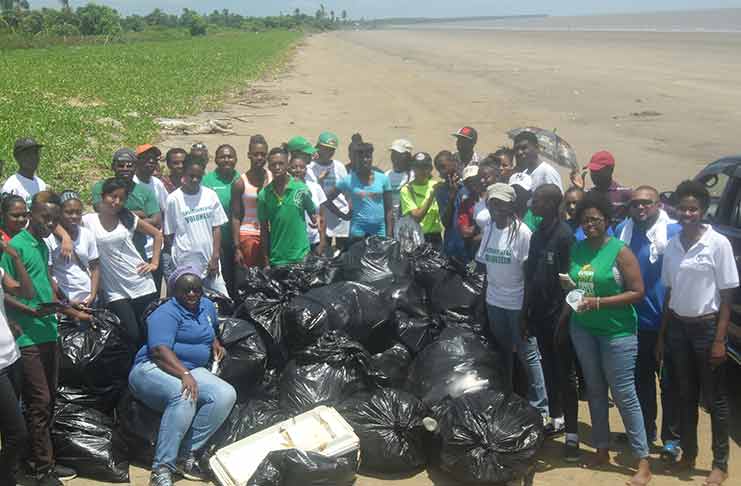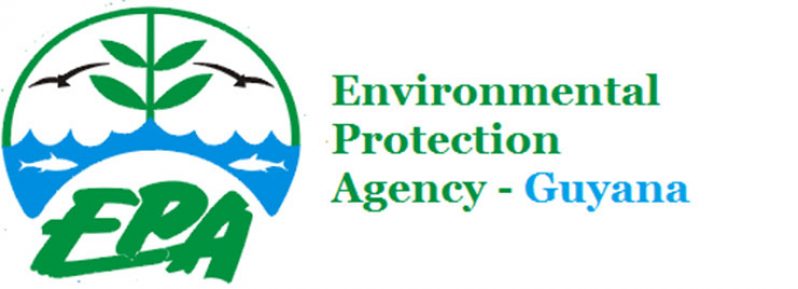Encouraging solutions for a healthy ocean
FOR our World Environment Day and Earth Day celebrations, the focus was on putting an end to plastic pollution. For World Oceans Day, another key day on the environmental calendar, the fight against plastic pollution continues. World Oceans Day, celebrated each year on June 8, focuses on encouraging solutions for a healthy ocean.
By now, we should understand the link between plastic pollution and the ocean environment but just to reiterate, once plastics are disposed of in an improper manner, they don’t just stay still. They travel and more often than not, end up in our drains, canals, trenches, creeks, streams, rivers and ultimately, our oceans.

Why? Because water bodies are interconnected. While we usually think of this as a global issue, right here in Guyana, our marine animals feel the impact of plastic pollution. The plight of our sea turtles, especially the leatherback has been well documented. But to elaborate on the issue, here are some additional effects of pollution in our oceans:
Entanglement /entrapment
Animals are attracted to litter items due to their natural curiosity or while in search of food or shelter. As a result, they can become trapped and while entanglement /entrapment may not necessarily cause death, it causes torturous pain. Entanglement can also result in the animal not growing normally, as the item can become embedded in the animal’s flesh as it grows around it.
“Ghost fishing”
So-called “ghost nets” are accidentally lost or deliberately discarded fishing nets that continue to catch fish as they keep on drifting in the sea or along the bottom, often for very long periods. Their “catch” attracts other fish, mammals and seabirds searching for food, which is often caught or entangled in them, causing a vicious lethal circle.
Ingestion
Fish, birds and mammals may swallow a litter item accidentally or because it resembles their prey. For example, turtles eat plastic bags mistaking them for jellyfish. Ingestion can lead to starvation or malnutrition if the ingested items fill up their stomach. Sharp objects, e.g., metal and broken glass, can wound the digestive tract and cause infection and pain. Ingested items may also block the animal’s air passage, and eventually cause its death by suffocation.?
Bio-accumulation
Birds of prey and other carnivorous animals have been found with large concentrations of plastics in their stomachs after preying on smaller birds that previously ingested fish with these plastics in them. Marine organisms are also exposed to toxics released from litter items. These toxics either have a direct effect or bio-accumulate in other animals feeding on them. For humans who are at the top of the food chain, the consequences are yet unknown.
Economic effects
Littered beaches reduce tourism potential. Fewer tourists coming to an area means less income for the coastal communities. Additionally, beach cleanups are costly, especially in remote areas that are difficult to access or lack infrastructure (waste bins, etc.).
Damage to livelihoods
Fishermen are also affected by marine pollution. Drifting fishing nets and ropes can wrap around propellers, anchors, etc. causing costly or irreparable damage. Also, the “ghost nets” that continue to trap fish, leave fishermen with smaller catches.
As we go forward, we encourage all to make the pledge to keep our oceans free of plastic pollution. It only takes small actions.
What can you do?
Use reusable shopping bags
Choose fresh fruits and vegetables
Carry your reusable water bottle
Avoid products with microbeads
Refuse single-use plastics
Choose reusable crockery and cutlery
You can share your ideas and questions by sending letters to: “Our Earth, Our Environment”, C/O ECEA Programme, Environmental Protection Agency, Ganges Street, Sophia, Georgetown, or email us at eit.epaguyana@gmail.com or follow us on Facebook and Instagram.




.png)









